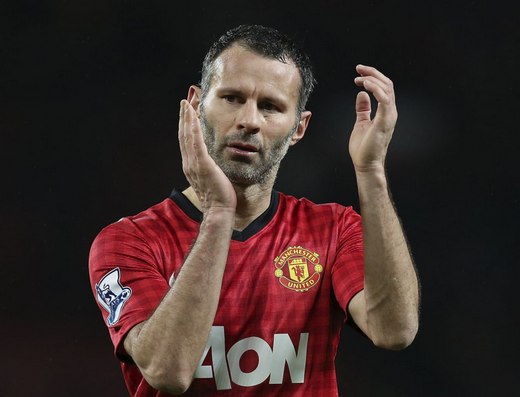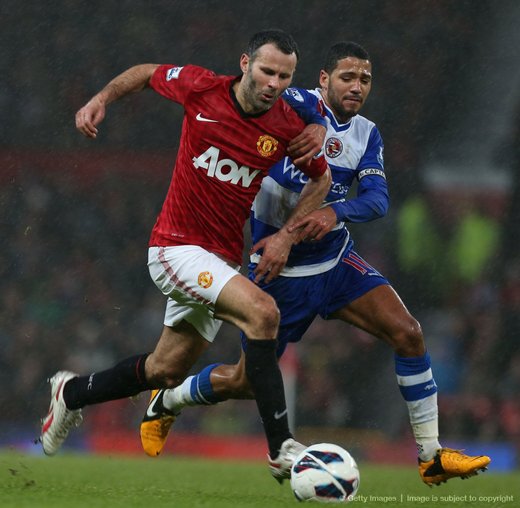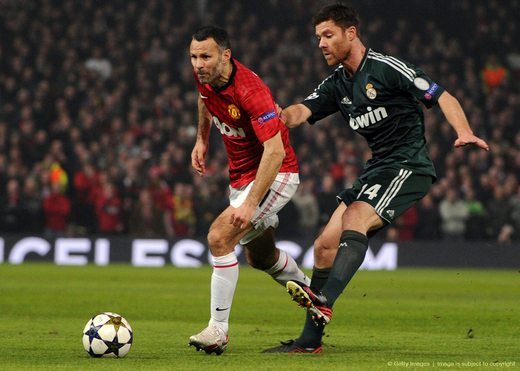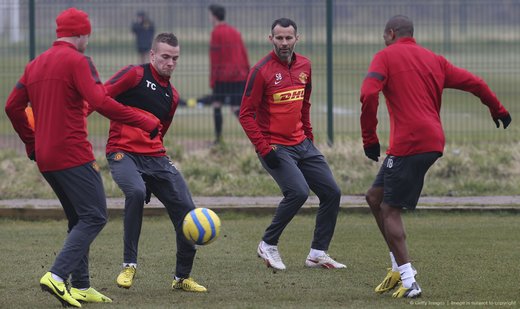News
The Changing Man - Ryan Giggs

We’ve heard often enough that the dictionary has nothing more to offer those attempting to describe Ryan Giggs. The man transcends definition, not least because he is a study in sporting evolution.
Examine the setting for Giggs’ 1,000th career game, in his 40th year. Reaching such a marker would be a noteworthy feat even for the most battle-hardened lower-league clogger, but United’s record appearance-maker met the milestone as a right winger against Real Madrid in the Champions League and won the man of the match award.
His senior career pre-dates the National Lottery, the commercialisation of the Internet and the birth of Phil Jones, yet still Giggs is as functional as he has ever been – arguably a better player than he was five years ago and quite possibly ten years ago. Moreover, he is a different player. Armed with the experiences of 23 seasons in Sir Alex Ferguson’s first team, he is a highly-sophisticated tactical weapon deployable at his manager’s behest.

The jet-heeled whippet who scourged right-backs with his turf tapestry is long gone, but all of his experiences have been retained. Giggs may now be more silver than quicksilver, yet he’s capable of operating on either wing, off a striker, in central midfield or, at a push, as an auxiliary left-back. On Boxing Day 2008, as United chased victory at Stoke City, 35-year-old Giggs moved to the left side of defence for 25 minutes to accommodate Dimitar Berbatov’s introduction. United won and kept a clean sheet.
“His flexibility has improved with age,” says assistant manager Mike Phelan. “He can play in numerous positions now and adapt into those that require more maturity. When he was younger, he got away with a lot of things because he was young and he could make mistakes. He was seen as a wide player with great dribbling skills and pace and quality on the ball, whereas now he’s brought all those to the fore in different positions. Maturity gives you that.
“In his early career he was surrounded by quality which allowed him to be young, effervescent and show his real qualities, which were his skills. That was accepted by the team, the fans and the club and the excitement he produced when he was young was because he was young, he was capable of making mistakes and he was allowed to make them in order to develop.”
There are complexities to being a 39-year-old footballer at the highest level, so being immersed in consistency has helped. Giggs has represented one club under one manager for almost a quarter of a century – an obvious boon. So too are the Welshman’s physical attributes: a light, slender, aerodynamic frame built to last and resist the ravages of time.
According to those who have worked with Giggs, the secret to his perpetual evolution – and his success over that time period - has been cerebral. It seems even age can be duped by intelligence. “He’s an incredibly open-minded athlete,” says Mike Clegg, who worked with Giggs for over 11 years as United’s former strength and conditioning coach. “He regenerates his youth all the time by being open-minded. When I worked with him, he always allowed me to show him different things that I thought might help him. He would consider anything.
“Everyone knows he does yoga. He did boxing and weightlifting too and has tried all sorts – he even gave trampolining a go when he was 34 or 35 – but one example still sticks with me. A few years ago, Ryan wasn’t happy with his crossing and he wanted to perfect it, but didn’t know why he couldn’t. By chance, I noticed that he wrote right-handed, and it didn’t look right, so we chatted and I told him to spend more time working with his left hand to create a balance, because the right-hand side of your brain affects the left-hand side of your body, and vice-versa.
“We spent about a month playing left handed darts, table tennis – he was beating me with his left hand in about a minute – and it appeared more natural to him. From there we moved into the sports hall at Carrington to practice his crossing – he’d run along and chip the ball in at a gym ball that I was throwing up in the air. By the end, he was hitting the gym ball nine out of ten times – others tried and nobody could match him. Ryan would do virtually anything to get those extra parts of a percent to make himself better.”

While still honing the staples of his wingplay, Giggs also diversified himself positionally. When Rene Meulensteen – now first team coach, but originally United’s first skills coach – arrived in Sir Alex Ferguson’s setup, Giggs was one of the first senior players to tap into the Dutchman’s toolbox of trickery.
“Ryan wanted to rediscover himself,” said Meulensteen. “His main strength is that he’s got magnificent skill from himself, with a lovely element of disguise, and another asset was always running with the ball and manipulating it. Because of one or two previous injuries and the onset of age, he might not have been as explosive as he was , so what then helps is having turns and moves in your locker to compensate, and he’s really added that to his game. You see a lot more Cruyff turns or stepovers which have served him well.”
Such chicanery is an invaluable asset in a congested midfield minefield, where Giggs has increasingly been deployed in recent seasons – in 2008/09 he was named PFA Player of the Year, an accolade which eluded him in all his years as a winger. For United’s head of fitness, Tony Strudwick, such reinvention provokes parallels with one of sport’s all-time greats.
“Take Michael Jordan,” says Strudwick. “In his early career he was a power forward who would drive and bounce people out of the way. He came out of basketball and later returned to it, but found he couldn't play that way anymore. Because of his qualities he relied more on the jump shot he used to practice. It's evolution. The top athletes find solutions to problems, and that's what it is for Ryan.”
Giggs found himself troubled earlier this season, after being substituted at half-time in the Reds’ home defeat to Tottenham. “I was awful,” he admitted. “I was down, but my thinking was: ‘What you going to do about it?’” Inevitably, he quickly came up with an answer. “It’s just stupid things, like saying: ‘Right, I’m not going to have butter on my toast. I’m going to make sure I go to bed an hour earlier. I’m going to make sure I go home after every training session for a couple of weeks and rest my legs. I’m going to do extra running.’ There’s no alcohol, certainly. I make sure I don’t eat late at night. It’s about making sure I’m right physically because mentally I’m okay.”
After the Tottenham debacle, Ryan’s next start came in United’s Capital One Cup defeat to Chelsea. In a staggering 120-minute outing as the lighthouse in a sea of youthful tumult, Giggs started on the left wing, moved into midfield in a tactical rejig and scored twice as the Reds were edged out by a near full strength Blues side.
As the months have passed by, Giggs has continued to improve. His outing against Jose Mourinho’s Real Madrid was borne not of sentiment, but necessity. A fit, experienced, intelligent player in form starts such games. That Ryan is 39 matters not a jot, as shown by his starring role despite United’s numerical disadvantage against the La Liga giants. Such outings require planning – Sir Alex and his staff look three or four games forward when considering tactical approaches – and the use of Giggs provokes most careful consideration.

“I think he’s definitely improving, and he’s doing that because he can rest in-between games,” says Phelan. “He doesn’t have the intensity of playing all the time every week plus training every day every week. I think it also helps that he’s at Manchester United, with what its facilities can offer him and back up from the staff. He can put in all the hard work but we can give him the tools to make sure he’s in peak performance form at any given time.
“He turns in a performance every time he plays, wherever he plays, simply because his preparation and his longevity have been fantastic. His attention to detail is first class. He knows now exactly how the body of a 39-year-old works and he knows when to rest, when to train and what quality of training he needs. He has no peers out there. He’s leading the way and when you come to the big games and the big moments, his reliability is first class for the staff and the manager, however he is played.”
And so to the great, unanswered question: when will it all end? There were doubts over whether Giggs could surpass Sir Bobby Charlton’s longstanding appearances record. That was five years ago.
“There’s no point looking to an end game,” laughs Phelan. “He’s used what sport is all about in recreating, redeveloping, re-emerging, and his talent has come through. As long as he’s fit and healthy, with a love for the club and football and happiness in his life then you just keep getting him out there on the training ground and see where we go with it.”
Ryan Giggs’ end point, like the man himself, is as yet undefined.


